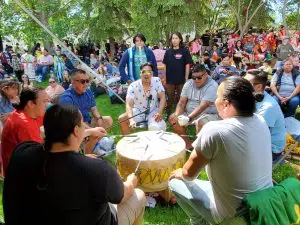A course being piloted by St. Thomas College is instructing college students how you can sift by means of on-line misinformation, and the province’s training minister is suggesting the identical be taught to elementary college kids.
The Fredericton college tweeted Tuesday that it is providing a brand new course from its English division known as Digital Literacy, saying it should “present college students with the abilities they must be vital thinkers within the age of social media and faux information.”
David Shipley, CEO of Beauceron Safety, a Fredericton cybersecurity agency, retweeted it, including “Love this, however we’d like it in highschool,” and tagged Training and Early Childhood Improvement Minister Dominic Cardy within the publish.
“Or main college …” Cardy responded.
The brand new course, and the Twitter change about how younger the recipients of such instructing needs to be, comes after years of specialists sounding alarms concerning the impression misinformation is having on public belief in establishments and democracy typically.
This week, Canada’s chief electoral officer issued a report on the final two federal elections. Amongst different issues, it known as on on-line platforms to publish insurance policies explaining how they may deal with the unfold of disinformation “that inaccurately depicts election-related procedures in the course of the election interval.”
In March, the Canadian Election Misinformation Challenge, run by McGill College and the College of Toronto, stated it discovered messages that claimed Canadians who weren’t totally vaccinated can be unable to vote had been broadly circulated on social media over the last election.
The COVID-19 pandemic has introduced by itself wave of misinformation round vaccines and the seriousness of the illness.
“I feel it is fantastic. I feel it is desperately wanted,” Shipley stated of the course being supplied by St. Thomas College.
“I feel it is one thing that we should always most likely see in earlier within the college system, at the very least on the secondary highschool degree, however perhaps even a place to begin on the main degree.
“Educating folks how you can suppose critically is an absolute asset to us on the planet we now stay in,” stated Shipley.
Vertical versus lateral studying
Andrew Klein, an assistant professor at St. Thomas College, put the course collectively alongside together with his colleague Katherine Thorsteinson.
He stated the course was born out of a recognition that college college students are relying extra on on-line materials for not solely getting their homework achieved, but in addition shaping their views on the world.
One of many ideas included within the course is that of vertical versus lateral studying.
With vertical studying, college students are guided on what to look out for when analyzing an article or piece of knowledge for any biases or agendas, Klein stated.
Lateral studying is the follow of visiting a number of totally different on-line info sources when researching a particular occasion or subject.
Klein stated the idea is vital for with the ability to analyze the best way an occasion or thought is being introduced, after which evaluating that to the best way it is achieved by different sources.
“I take into consideration issues just like the latest convoy conditions in Canada, as an example,” Klein stated. “Relying on what social media platforms or information retailers you checked, you had been getting a very totally different story about what is going on on there.”

Taking info with no consideration
Within the time since Klein was a college scholar himself, he is seen how know-how has modified the best way college students entry info.
As a result of there’s a lot on the market for them, they do not all the time have or have not all the time given themselves a second to only take into consideration the place all these things is coming from.-Andrew Klein, assistant professor of English at St. Thomas College
One such instance is when he was instructing a course for which a preferred graphic novel was on the studying record.
Whereas at school, he seen a few of the college students had been following alongside on their laptops, and after inquiring about it came upon they’d accessed the e-book from an unlawful web site that republishes copyrighted works.
“And so I might say that this era, as a result of there’s a lot on the market for them, they do not all the time have or have not all the time given themselves a second to only take into consideration the place all these things is coming from.
“And hopefully this course will get them to decelerate or pump the brakes somewhat bit and rethink the place any of their info is coming from.”
A necessity for a similar at earlier training levels
The truth that some college college students need assistance parsing out what’s true on-line, is proof that training is required at earlier levels, Klein stated.
Plus, he famous not each highschool scholar goes to get a post-secondary training and get uncovered to programs just like the one supplied at St. Thomas.

He stated he has seen his kids are receiving some instruction in elementary and center college round on-line security, however would not suppose it goes far sufficient.
“They need to be getting much more of it, if not the first degree, on the secondary degree, as a result of actually, as soon as college students hit their teenagers, they hit the Web arduous.
“So that they actually do want to start out desirous about what they’re studying, the place it is all coming from. So completely, I completely agree.”
Training Minister Cardy didn’t reply to a request for an interview.
